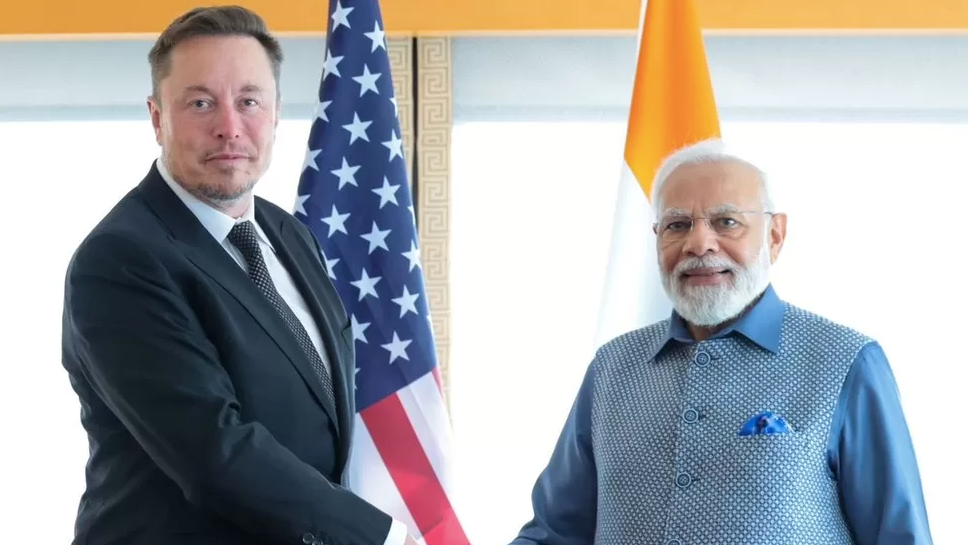|
Getting your Trinity Audio player ready...
|
In an eagerly awaited development, Tesla CEO Elon Musk has announced plans to establish the electric car manufacturer’s presence in India “as soon as humanly possible.” Musk’s statement came after a meeting with Indian Prime Minister Narendra Modi, who is currently on a state visit to the United States. The Indian government extended an invitation to Musk to explore investment opportunities in electric mobility and the commercial space sector.
Acknowledging the invitation, Musk expressed his intention to determine the optimal timing for Tesla’s entry into the Indian market. This discussion between Musk and Modi followed recent remarks by Twitter co-founder Jack Dorsey, who accused India of threatening to shut down the social media platform for non-compliance with content takedown requests. The Indian government swiftly refuted Dorsey’s claims, dismissing them as “an outright lie.”
Commenting on the episode, Musk emphasized the importance of adhering to local regulations, stating that Twitter had no choice but to comply with government directives or risk being shut down. He affirmed his commitment to providing the “freest speech” allowed within the bounds of the law.
Expressing his admiration for Prime Minister Modi, Musk commended India’s potential, describing it as having “more promise than any large country in the world.” He revealed that Modi’s insistence on significant investments in India had influenced Tesla’s decision to enter the market, adding that the company was currently assessing the most opportune timing for its expansion.
Tesla has been engaging in discussions with Indian officials and ministers as part of its efforts to establish a foothold in the Indian market. Reports from last month indicated that Tesla had proposed the establishment of an electric vehicle manufacturing factory in India and was considering local production of EV batteries. Federal minister Rajeev Chandrasekhar had affirmed that Tesla was seriously exploring India as a potential production and innovation base.
Previously, Tesla’s plans to enter the Indian market were put on hold due to the Indian government’s requirement for local production, while Tesla expressed its desire to assess demand through exports initially. Musk also expressed hopes of introducing Starlink, the satellite internet service operated by SpaceX, in India, further solidifying the potential investment and collaboration between Tesla and the country.
As Prime Minister Modi embarks on his three-day state visit to the United States, his meeting with President Joe Biden holds significant importance for bilateral relations between India and the US. However, over 70 US lawmakers have urged President Biden to address human rights concerns with Prime Minister Modi during their discussions. These concerns include religious intolerance, press freedoms, and the targeting of civil society groups in India.
The anticipation of Tesla’s entry into the Indian market brings renewed excitement for electric mobility and technological advancements, while bilateral discussions between India and the US will likely address broader issues of mutual interest and cooperation.
The bilateral discussions between India and the United States are anticipated to cover a wide range of topics beyond Tesla’s entry into the Indian market. Prime Minister Modi’s visit to the US marks a crucial turning point for the two nations, with both leaders expected to engage in dialogues that foster cooperation and address shared challenges.
During his stay, Prime Minister Modi will be accorded a ceremonial welcome at the White House, followed by direct talks with President Joe Biden. The discussions are expected to encompass various areas of mutual interest, including trade, climate change, technology, and security cooperation. Both countries have expressed their commitment to strengthening their strategic partnership and exploring avenues for further collaboration.
Ahead of the talks, over 70 US lawmakers penned a letter to President Biden, urging him to address human rights concerns during the meeting with Prime Minister Modi. The lawmakers raised concerns regarding issues such as religious intolerance, press freedoms, and the targeting of civil society groups in India. These concerns reflect the ongoing importance of human rights and democracy in shaping the bilateral relationship between the two nations.
The meeting between Prime Minister Modi and President Biden provides an opportunity for open and frank discussions on these sensitive matters, demonstrating the strength of democratic values and the willingness to address areas of contention. While bilateral relations have seen their share of challenges, the meeting serves as a platform for constructive engagement and the fostering of a deeper understanding between India and the United States.
As the global community faces numerous complex issues, including the ongoing pandemic, climate change, and geopolitical dynamics, the discussions between the two leaders hold the potential for joint efforts and collaborations on a global scale. The outcomes of these talks will undoubtedly shape the future trajectory of the India-US relationship and have far-reaching implications for regional and international affairs.
In conclusion, the imminent entry of Tesla into the Indian market, coupled with the discussions between Prime Minister Modi and President Biden, signifies a promising phase in India-US relations. As the world closely watches the outcomes of these engagements, it is hoped that they will pave the way for enhanced cooperation, shared prosperity, and a strengthened partnership between the two nations on various fronts.



